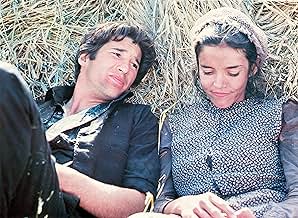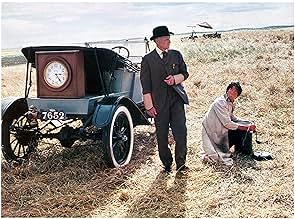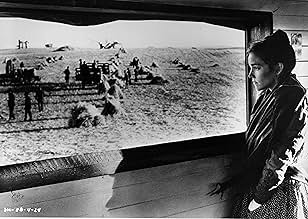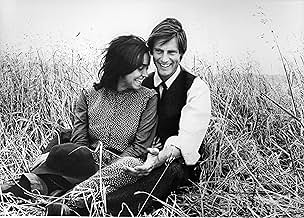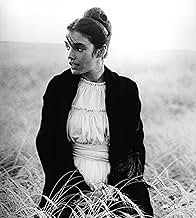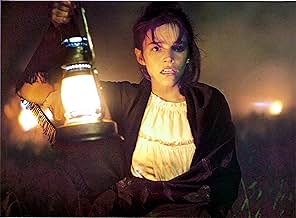Ein aufbrausender Landarbeiter überzeugt die Frau, die er liebt, ihren reichen, aber sterbenden Chef zu heiraten, damit sie Anspruch auf sein Vermögen haben.Ein aufbrausender Landarbeiter überzeugt die Frau, die er liebt, ihren reichen, aber sterbenden Chef zu heiraten, damit sie Anspruch auf sein Vermögen haben.Ein aufbrausender Landarbeiter überzeugt die Frau, die er liebt, ihren reichen, aber sterbenden Chef zu heiraten, damit sie Anspruch auf sein Vermögen haben.
- 1 Oscar gewonnen
- 13 Gewinne & 13 Nominierungen insgesamt
Robert J. Wilke
- The Farm Foreman
- (as Robert Wilke)
Timothy Scott
- Harvest Hand
- (as Tim Scott)
Terrence Malick
- Mill Worker
- (Nicht genannt)
Empfohlene Bewertungen
10katsat
If any movie could be called filmed poetry, this would be it. From its first opening shot to its last frame, there is such lyricism and emotion and beauty that it almost leaves you speechless. I have not seen this movie in years, but it still affects me and I want to write about it. There is a pervading sadness to the movie, like a memory of something wonderful that could have been, that should have been, that almost was, and is all the more tragic because it was in your hands but slipped through your fingers. This is not a movie for everyone, but if you believe that film can be one of the highest forms of art, this is the film to see.
"Days of Heaven" is a beautiful film with fantastic panoramic cinematography. It's hard to say what it is about this film that captivated me from the start. I didn't expect to enjoy it when I read about the plot. Farm workers? How could that be interesting... But oh, the haunting, heavenly silence of the fields undulating in the wind, a silence not sundered by any garish music. Everything about this film is tangible, real, alive. The dialogue is sparse, believable, the bond between Bill and Abby is one of quiet passion that needs no dramatic proclamations to fuel it. And Sam Shepard's farmer is touching. I don't use that word very often, but I'll venture it here. I have watched this film now several times, and it is a delight each time when the farmer first sees Abby. This perhaps the strongest and most believable love triangle ever put to film, and in my opinion, the most compelling.
Terrence Malick is less a storyteller than a visual poet. At times, the images in 'Days of Heaven (1978)' seem too beautiful to be believed – could Mother Nature even construct such moments of magnificence at her own accord? Cinematographers Néstor Almendros and Haskell Wexler (credited only as "additional photographer") consistently shot the film during the "magic hour" between darkness and sunrise/sunset, when the sun's radiance is missing from the sky, and so their colours have a muted presence, as though filtered through the stalks of wheat that saturate the landscape. Crucial alongside the film's photographers are composer Ennio Morricone – utilising a variation on the seventh movement ("Aquarium") in Camille Saint-Saëns's "Carnival of the Animals" suite – and a succession of sound editors, whose work brings a dreamy, ethereal edge to the vast fields of the Texas Panhandle. The film's final act, away from the wheat-fields, recalls Arthur Penn's 'Bonnie and Clyde (1967),' but otherwise Malick's style, contemplative and elegiac, is in a class of its own, more comparable perhaps to Kurosawa's 'Dersu Uzala (1975).'
Malick refuses to explore his characters' motivations. The viewer is deliberately kept at an arm's length, and Malick eschews cinema's traditional notions of narrative development. Instead, the story is told as a succession of fleeting moments, the sort that a young girl (the film's narrator, Linda Manz) might pick up through her day-to-day experiences and muted understanding of adult emotions. Note that the girl is always kept separate from the dramatic crux of the film – the love-triangle between Billy, Abby, and the Farmer – and her comprehension of events is tainted by her adolescent grasp on adult relationships and societal norms. I was reminded of Andrew Dominik's recent 'The Assassination of Jesse James by the Coward Robert Ford (2007)' {another sumptuously-photographed picture}, which also refused to explore its title character, Jesse James, kept at a distance through the impartial objectivity of the historical narrator. In Malick's film, Linda's narration tells us one thing, and the viewer sees another. But one can never fully understand the complex emotions driving human behaviour, so perhaps the girl's perspective is as good as any other.
'Days of Heaven' derives its title from a passage in the Bible (Deuteronomy 11:21), and Malick's tale of jealousy and desire is suitably Biblical in nature. Essential to this allegory is an apocalyptic plague of locusts, which descend upon the wheat-fields like an army from the heavens. When the fields erupt into flame, quite literally from the broiling emotions of the film's conflicted characters, the viewer is confronted by the most intense manifestation of Hell-on- Earth since the burning village in Bondarchuk's 'War and Peace (1967).' But, interestingly, Malick here regresses on his own allegory: Judgement Day isn't the end, but rather it comes and goes. Life is driven by the inexorable march of Fate: The Farmer (Sam Shepard) is doomed to die within a year; Bill (Richard Gere) is doomed to repeat his mistakes twice over. In the film's final moments, Linda and her newfound friend embark purposelessly along the railway tracks, the tracks being a physical incarnation of Fate itself: their paths are laid down already, but we mortals can never know precisely where they lead until we get there.
Malick refuses to explore his characters' motivations. The viewer is deliberately kept at an arm's length, and Malick eschews cinema's traditional notions of narrative development. Instead, the story is told as a succession of fleeting moments, the sort that a young girl (the film's narrator, Linda Manz) might pick up through her day-to-day experiences and muted understanding of adult emotions. Note that the girl is always kept separate from the dramatic crux of the film – the love-triangle between Billy, Abby, and the Farmer – and her comprehension of events is tainted by her adolescent grasp on adult relationships and societal norms. I was reminded of Andrew Dominik's recent 'The Assassination of Jesse James by the Coward Robert Ford (2007)' {another sumptuously-photographed picture}, which also refused to explore its title character, Jesse James, kept at a distance through the impartial objectivity of the historical narrator. In Malick's film, Linda's narration tells us one thing, and the viewer sees another. But one can never fully understand the complex emotions driving human behaviour, so perhaps the girl's perspective is as good as any other.
'Days of Heaven' derives its title from a passage in the Bible (Deuteronomy 11:21), and Malick's tale of jealousy and desire is suitably Biblical in nature. Essential to this allegory is an apocalyptic plague of locusts, which descend upon the wheat-fields like an army from the heavens. When the fields erupt into flame, quite literally from the broiling emotions of the film's conflicted characters, the viewer is confronted by the most intense manifestation of Hell-on- Earth since the burning village in Bondarchuk's 'War and Peace (1967).' But, interestingly, Malick here regresses on his own allegory: Judgement Day isn't the end, but rather it comes and goes. Life is driven by the inexorable march of Fate: The Farmer (Sam Shepard) is doomed to die within a year; Bill (Richard Gere) is doomed to repeat his mistakes twice over. In the film's final moments, Linda and her newfound friend embark purposelessly along the railway tracks, the tracks being a physical incarnation of Fate itself: their paths are laid down already, but we mortals can never know precisely where they lead until we get there.
I can understand why Malick didn't make another movie after he made Days of Heaven. The film was panned by the majority of the critics who could only find the cinematography worthy of praise. However, Malick was hugely misunderstood by these dumb critics.
They complain that the film is ponderously slow. This was the intention. Malick used pause to convey that the characters think. Too many actors rattle off their lines without letting their characters think of them. It also conveys the slow pace of their lives.
Critics complain that the characters are too remote - one feels removed from them and can't get involved. Hello! It is narrated by a 13 yr old and is essentially her view of the events that transpired. Naturally she does not grasp most of the more adult moments between them and thus is herself removed from being fully involved in Bill and Abby's relationship and that is what has to come across.
Then Malick, in a moment of genius, allied the four main characters to the four elements; Earth, Air, Fire & Water. Bill is Fire - he is seen at first in front of the furnaces of a foundry where he works. We can see his temper is volatile. Abby is water - in the very first shot she is scavenging(?) by a stream and she is seen against the backdrop of the river. Linda is Earth - In her narration she says that she is close to the "Oith". The Farmer is Air - constantly tinkering with his weather vane, and his fields of wheat are often seen waving in the wind.
All in all a severely mies-judged film and the critics owe Malick a huge apology. The work is pure genius!
They complain that the film is ponderously slow. This was the intention. Malick used pause to convey that the characters think. Too many actors rattle off their lines without letting their characters think of them. It also conveys the slow pace of their lives.
Critics complain that the characters are too remote - one feels removed from them and can't get involved. Hello! It is narrated by a 13 yr old and is essentially her view of the events that transpired. Naturally she does not grasp most of the more adult moments between them and thus is herself removed from being fully involved in Bill and Abby's relationship and that is what has to come across.
Then Malick, in a moment of genius, allied the four main characters to the four elements; Earth, Air, Fire & Water. Bill is Fire - he is seen at first in front of the furnaces of a foundry where he works. We can see his temper is volatile. Abby is water - in the very first shot she is scavenging(?) by a stream and she is seen against the backdrop of the river. Linda is Earth - In her narration she says that she is close to the "Oith". The Farmer is Air - constantly tinkering with his weather vane, and his fields of wheat are often seen waving in the wind.
All in all a severely mies-judged film and the critics owe Malick a huge apology. The work is pure genius!
This movie was a full and happy surprise for me. This man, Malick, stood twenty years out of business because he had to be, afterwards, after such a beautiful movie he couldn't and shouldn't return with any other thing shorter than this.
Days Of Heaven is absolutely perfect cinema, the plot is not important, Malick simply wants to fill your senses and he achieves it.
I haven't had the chance to watch it in a theatre, I was four years old at the time, I've watched it on television, and I understood immediately, this man is a hero for building up such a magnificent film in the United States, in Hollywood.
A true director builds a universe of his own, with its own "time flow" and dreams and that is what Malick achieved with this film, magic, sacral art. Some sequences are "almost" (a big almost) Tarkovskyand this is a big commendation.
Days Of Heaven is absolutely perfect cinema, the plot is not important, Malick simply wants to fill your senses and he achieves it.
I haven't had the chance to watch it in a theatre, I was four years old at the time, I've watched it on television, and I understood immediately, this man is a hero for building up such a magnificent film in the United States, in Hollywood.
A true director builds a universe of his own, with its own "time flow" and dreams and that is what Malick achieved with this film, magic, sacral art. Some sequences are "almost" (a big almost) Tarkovskyand this is a big commendation.
Wusstest du schon
- WissenswertesThe shot of locusts ascending to the sky was shot in reverse with the helicopter crew throwing peanut shells down, and actors walking backwards.
- PatzerTowards the end of the movie, Bill fires three shots from a double-barreled shotgun without reloading.
- SoundtracksEnderlin
Written and Performed by Leo Kottke
Used by permission of Overdrive Music A.S.C.A.P. Copyright 1978
Top-Auswahl
Melde dich zum Bewerten an und greife auf die Watchlist für personalisierte Empfehlungen zu.
- How long is Days of Heaven?Powered by Alexa
Details
- Erscheinungsdatum
- Herkunftsland
- Sprachen
- Auch bekannt als
- Días de gloria
- Drehorte
- Lethbridge, Alberta, Kanada(Lethbridge Viaduct High Level Railroad Bridge)
- Produktionsfirma
- Weitere beteiligte Unternehmen bei IMDbPro anzeigen
Box Office
- Budget
- 3.000.000 $ (geschätzt)
- Bruttoertrag in den USA und Kanada
- 3.446.749 $
- Weltweiter Bruttoertrag
- 3.492.909 $
- Laufzeit1 Stunde 34 Minuten
- Farbe
- Seitenverhältnis
- 1.85 : 1
Zu dieser Seite beitragen
Bearbeitung vorschlagen oder fehlenden Inhalt hinzufügen





